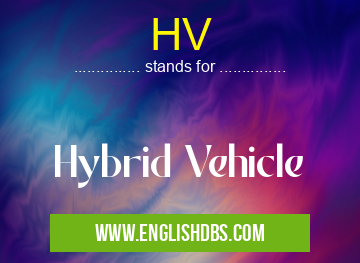What does HV mean in ENVIRONMENTAL
In the realm of transportation, the term HV often appears, but what does it actually mean? HV stands for Hybrid Vehicle, a type of automobile that combines both a traditional internal combustion engine with an electric motor and battery. This unique combination offers significant advantages in terms of fuel efficiency and reduced emissions.

HV meaning in Environmental in Governmental
HV mostly used in an acronym Environmental in Category Governmental that means Hybrid Vehicle
Shorthand: HV,
Full Form: Hybrid Vehicle
For more information of "Hybrid Vehicle", see the section below.
Types of Hybrid Vehicles
Hybrid vehicles come in various types, each with its own set of characteristics:
-
Parallel Hybrids: These feature a single electric motor that assists the internal combustion engine, providing additional power and fuel savings under certain driving conditions.
-
Series Hybrids: In this configuration, the internal combustion engine primarily serves as a generator to power the electric motor, which drives the wheels.
-
Plug-in Hybrids: As the name suggests, these hybrids can be plugged into an electrical outlet to recharge their batteries. This allows for extended all-electric driving ranges.
Benefits of Hybrid Vehicles
Hybrid vehicles offer numerous advantages over traditional gasoline-powered vehicles:
-
Improved Fuel Efficiency: By utilizing both an electric motor and an internal combustion engine, hybrids can significantly reduce fuel consumption compared to conventional vehicles.
-
Reduced Emissions: The electric component in hybrid vehicles helps lower emissions, particularly in urban areas where stop-and-go traffic is common.
-
Enhanced Performance: Electric motors provide instant torque, resulting in improved acceleration and responsiveness.
-
Lower Maintenance Costs: Hybrids typically have lower maintenance costs than internal combustion engine vehicles due to reduced wear and tear on the engine and brake components.
Essential Questions and Answers on Hybrid Vehicle in "GOVERNMENTAL»ENVIRONMENTAL"
What is a Hybrid Vehicle (HV)?
A hybrid vehicle (HV) combines two or more sources of power to move, typically an internal combustion engine (ICE) and an electric motor. This combination provides better fuel efficiency and lower emissions compared to conventional vehicles.
How does a HV work?
HVs use a combination of an ICE and an electric motor to propel the vehicle. The electric motor assists the ICE during acceleration and provides power for low-speed driving and idling. When braking, the electric motor can regenerate energy and store it in a battery.
What are the different types of HVs?
There are several types of HVs, including:
- Parallel Hybrid: The ICE and electric motor are both connected to the transmission, allowing the vehicle to operate in either mode.
- Series Hybrid: The ICE is used to generate electricity, which powers the electric motor. The ICE is not directly connected to the wheels.
- Plug-in Hybrid: In addition to the ICE and electric motor, plug-in hybrids have a larger battery that can be charged externally. This allows for extended electric-only driving range.
What are the benefits of HVs?
HVs offer several benefits, including:
- Improved Fuel Efficiency: HVs use less fuel compared to conventional vehicles due to the assistance of the electric motor.
- Reduced Emissions: The combination of ICE and electric motor reduces tailpipe emissions, contributing to cleaner air.
- Smooth and Quiet Operation: Electric motors provide a smooth and quiet driving experience, especially at low speeds.
What are the limitations of HVs?
HVs have a few limitations to consider:
- Higher Initial Cost: HVs typically have a higher initial cost compared to conventional vehicles due to the additional complexity of the hybrid system.
- Battery Longevity: HV batteries have a limited lifespan and may need to be replaced over time, which can be an additional expense.
- Limited Electric-Only Range (for some HVs): Some HVs have a limited electric-only range, which may not be suitable for long-distance driving.
Final Words: Hybrid vehicles (HVs) represent an environmentally friendly and fuel-efficient alternative to traditional automobiles. By combining an electric motor with an internal combustion engine, hybrids deliver both performance and cost savings. As the transportation industry continues to embrace sustainable solutions, HVs are likely to play a significant role in reducing emissions and promoting cleaner air.
